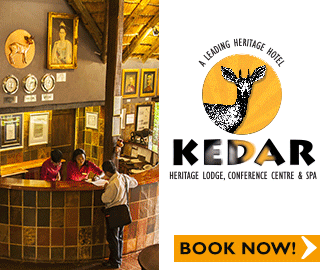

Tourism in Africa: An Untapped Goldmine?
BY BRUCE GERMAINE | 15 October 2017 11:50
There can be no doubt in anyone’s mind, especially seasoned travellers, that Africa has a vast and diverse offering of tourist attractions, a very rich cultural heritage and natural beauty – and yet the feeling remains that Africa is an untapped goldmine. eons more fascinating, complex, mystifying and mysterious than mere unruly, gun-toting rebels on the one hand and ultra- luxury lodges sporting the so-called Big-5 on the other.
This comes as no surprise as Africa is in a constant state of flux and innovation ranging from Africa’s Common Passport as a catalyst to boosting Intra-Africa Travel to growing proud national airlines such as Air Mauritius, Kenya Airlines, Rwanda Air, to improving quality and accountability mechanisms under South Africa’s Grading Council. From hotel chain developments in West Africa to the staging of Africa’s premier world travel exhibitions such as Africa’s Travel Indaba in Durban, Meetings Africa in Johannesburg and the World Travel Market (WTM) Expo in Cape Town, African tourism stakeholders and role players are collectively playing a very important part in promoting this very untapped potential that Africa has.
With the United Nations proclaiming this year as the “International Year of Sustainable Tourism for Development” in recognition of the tremendous potential of the tourism industry which contributes to approximately 10% of the world’s economic activity, it is a most opportune time for public and private sector role players to pick up their game and for African countries to fine tune co-operative agreements that will foster tourism growth and giving momentum towards tapping Africa’s huge potential.
But can Africans afford to sit back and relax just yet ?
No, on the contrary. Government agencies such as South African Tourism, the official tourism marketing arm of the South African government, actively participate in various tradeshows across the continent such as the Magical Kenya Travel Expo in Nairobi, Akwaaba African Travel Market in Lagos, The Pearl of Africa Tourism Expo in Kampala, The Swahili International Travel Expo in Dar Es Salaam and Sanganai World Tourism Expo in Bulawayo.
“These markets have been identified as being integral to our mandate of marketing the destination and growing arrivals. At these tradeshows, where other destination marketing organizations and travel trade bodies and associations are also present, we hold strategic talks with the relevant authorities to talk about this very topic: how to work together for the benefit of the entire continent” says Margie Whitehouse, Chief Marketing Officer at South African Tourism (SA Tourism).
“We know that tourism is one industry that can definitely help contribute towards building and growing an economically vibrant and resilient Africa, and that key to achieving this is working together with other countries on the continent. Therefore, collaboration and partnerships are central to our strategy of marketing and promoting tourism and, in so doing, ensuring sustained growth in tourist arrivals.”
It takes two to tango with both private and public sectors stakeholders levelling the playing field when it comes to innovative programs to increase tourism numbers. Under the stewardship of CEO Sabine Blehle, the GoVacation Africa brand plans to consolidate its business by bringing more travellers into Africa by virtue of its existing customer base under its holding company Tourvest Destination Management (TDM).
“Tourvest Destination Management (TDM) and its subsidiary, GoVacation Africa, are Africa's leading vertically integrated tourism entity, which is perfectly positioned to take advantage of the potential this continent has to offer. Through our partnerships globally we have the ability to market Africa through our extended network and sales activities. Strong and healthy relationships with key partners contribute positively towards fulfilling our strategies” says GoVacation Africa CEO Sabine Blehle.
Simply put, “this presents an opportunity to grow travel into Southern Africa and the rest of Africa with our sales and marketing strategy leveraging off those customers that work with GoVacation into different destinations that are not on the African continent and attract them to the continent”, according to TDM CEO Martin Wiest.
In addition, SA Tourism’s new “five in five” strategy ( i.e. attract five million additional international and domestic tourists in the next five years), hopes to target specific regional and international markets with marketing campaigns to position South Africa as an attractive, value-for-money destination offering a range of authentic experiences.
Margie Whitehouse from SA Tourism :“We cannot grow South Africa’s tourism sector in isolation from the rest of the continent. Partnering with other countries and the private sector, and particularly with our African neighbours, is crucial if we want to elevate African tourism to being a major player on the global stage”
Nomad Africa asked South African Tourism how Africa fares internationally in terms of global tourism. “It’s fair to say that tourism is truly revitalising Africa – there was a 13% increase in international visitors to South Africa in 2016 and an 8% increase in international visitors to Africa as a whole last year, which is above the global average. This trend is continuing in 2017 and according to the latest UNWTO World Tourism Barometer, destinations worldwide received 369 million international tourists (overnight visitors) in the first four months of this year, 21 million more than during the same months in 2016 (or an increase of 6%).”
Interestingly, the UNWTO (2015) forecasts that between 2010 and 2030, arrivals in emerging destinations such as Africa are expected to increase at twice the rate (+4.4% a year) of those in advanced economies (+2.2% a year). This means that the number of arrivals in emerging economies is expected to exceed those in advanced economies before 2020. In essence it signifies great hope and vast potential for exponential tourism growth on the continent.
Looking at regional markets, although Africa has enormous potential, there is still work to be done. With high stakes at play members of the West African Economic and Monetary Union (UEMOA) and the Economic Community of West African States (ECOWAS) have become determined to make tourism a foundation of strong economic and social development. Private sector role players in West Africa such as hotel magnate and pioneer of the pan-African Azalaï Hotels Group Mossadeck Bally have invested back into Africa by establishing the Chiaka Sidibe Academy providing basic training, professional development, advice and support in the UEMOA countries such as Mali, Togo, Ivory Coast, Senegal, Guineau-Bissau and Burkina Faso.
But if one looks beyond the surface of pretty destinations West Africa’s progress is being hampered, according to Mossadeck Bally, by “low visibility on key markets, poor road and rail networks, inadequate and expensive air services and the absence of institutional and administrative mechanisms to provide incentives. Generally the hotels and tourism sector is not an investment priority, despite UEMOA directives, and there are no competitive incentives in place (such as customs or tax measures) to attract investment. The UEMOA states often prioritise mining and manufacturing, industries that add little value on a local scale.”
“The region’s instability also tarnishes its image as a destination and reduces tourist traffic. This was the case in Mali and Guinea-Bissau, two countries that suffered from military coups and political instability in 2012 and 2013”
This again was a recent case in point when Swedish national Johan Gustafsson and British South-African Stephen McGowan were released by al-Qaeda militants in Northern Mali after being held captive for 6. Both were the last 2 of an original group of 4 tourists that were captured in a restaurant in Timbuktu in 2011 when a German national was murdered. Subsequently a Dutch national was freed in 2015 in a raid by French special forces, with the last 2 hostages being released this year after lobbying by humanitarian aid organization Gift of the Givers.
The Azalaï Hotels Group CEO Mossadeck Bally pulls no punches: ”There are additional problems that complicate the situation and restrict hotel and tourism business, especially in UEMOA and ECOWAS countries. To begin with, hotel complexes are largely concentrated in urban areas, neglecting rural areas where inferior road, air and hotel infrastructures restrict domestic and leisure tourism. Training for hotel personnel in the UEMOA region is also inferior, sometimes non-existent, which reduces the quality of the services they can offer. Finally, unofficial accommodation chains and failure to observe building regulations have an impact on hotel occupancy rates and result in loss of earnings.”
“The lack of a dedicated financial structure to develop the tourism sector is also a problem. A number of factors deter commercial and custodian banks from financing the sector: the absence of long-term resources, a lack of specialist expertise in tourism financing, failure to tailor credit agreements to professional needs, lack of confidence in credit agreements and high interest rates. Too often, investors still see tourism as a high-risk sector.”
“The situation is exacerbated by two additional factors. On the one hand, operational costs are increased by taxes in the UEMOA member states and the high costs of basic services such as water, electricity and telecommunications. These costs are reflected in the tourist’s bills, making hotel and tourism infrastructures in the region less competitive and attractive. Furthermore, a lack of IT and information systems is hampering growth in tourism. African hotels rarely feature in CRS platforms, 5 and unstable internet speeds make it difficult to process online payments.”
So how do we solve this? The innovative hotel magnate has come up with five key initiatives that are earmarked to boost the regional tourism sector. First is to develop the tourism offer across the region by improving visitor sites and basic infrastructures like airports, roads, hotels and catering. Secondly, make UEMOA’s tourist destinations more visible and competitive by promoting tourism both internationally and across the region, and financing investment in tourism.
The third initiative is to introduce incentives to attract investment in the sector, especially by improving current mechanisms. Mali has implemented a tourism growth strategy that strengthens its “Investment Code”. This includes making national funds available, attracting foreign capital, creating jobs, training a qualified workforce, and developing a framework for a successful supplementary economy. In addition, build new road, rail and air infrastructures to open up tourist areas and make them more accessible to local and international tourists. Lastly, build capacity among key players in the sector such as national tourist bodies and consultation and training organisations, and set up a regional tourism information system.

“We know that tourism is one industry that can definitely help contribute towards building and growing an economically vibrant and resilient Africa, and that key to achieving this is working together with other countries on the continent. Therefore, collaboration and partnerships are central to our strategy of marketing and promoting tourism and, in so doing, ensuring sustained growth in tourist arrivals.”
“Scrupulous management and commitment to promises are needed to win the confidence of funding bodies like the IFC and Proparco. This is how the Azalaï Hotels Group developed its ability to secure funding” says Mossadeck Bally.
(The IFC, a member of the World Bank Group, is the largest global development institution focused on the private sector in emerging markets with long-term financing for developing countries, leveraging the power of the private sector to help end poverty and boost shared prosperity. Proparco is a subsidiary of Agence Française de Développement (AFD) focused on private sector development providing funding and support to both businesses and financial institutions across Africa, Asia, Latin America and the Middle-East).
According to Mossadeck Bally, the tourism sector also needs a dedicated funding mechanism to support growth in hotel capacity. A tourism investment fund can be created to provide long-term financing to players in the sector.
“West African countries should follow the example of Morocco, Tunisia and Mauritius, which are leaders in this regard. “
Looking at the competitive factor within Africa’s tourism sector, the 2017 World Economic Forum Travel and Tourism Competitiveness Report rates South Africa as the most competitive Sub-Saharan African country in tourism, ranked 53rd in the world, followed by Mauritius (55th), Morocco (65th), Kenya (80th) and Tanzania (91).
Although Africa commands rich cultural and natural resources, 29 million tourists that visiting the Sub-Saharan region in 2015 is still regarded as a low figure but nevertheless, Africa still offers a vast untapped business potential.
Interestingly, the report says a major factor that constrains tourism on the continent is the fact that African households have not seen the same kind of income increases enjoyed by, for example, Asian households resulting in only a fraction of African people being able to afford to travel. It is a fact that in most mature tourism economies, the bulk of their tourism revenue emanates from domestic leisure travel but this is happening in most African countries albeit where people are more likely to travel to visit friends and family rather than for holiday purposes.
According to Margie Whitehouse: “regional tourism markets have improved but are still under the international benchmark when compared globally. Southern Africa remains the strongest sub-region, followed by Eastern Africa and then Western Africa. On average, Eastern Africa is the most improved region, while Southern Africa has experienced a slight decline.”
“The East African regional tourism bloc made up of Kenya, Rwanda, Uganda and Tanzania has managed to successfully collaborate to build a regional tourism body that markets and promotes the region versus individual countries. They also lobby collectively too.”
There is no doubt that Africa, with its vast beauty and splendour, rich cultural heritage offers a huge expanse of untapped wealth in terms of tourism. It is up to African government, regional players, and all tourism sector stakeholders to actively co-ordinate this potential into a well-oiled machine, pooling resources, to partner and share and work collectively in order to compete globally.
Easier said than done, but Rome was not built in one day either.










